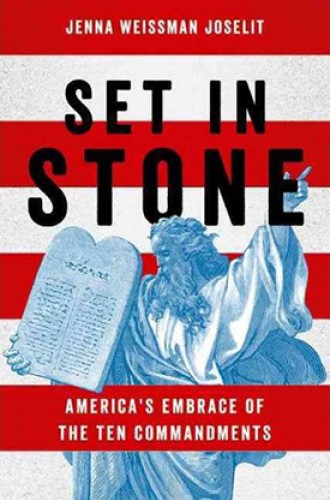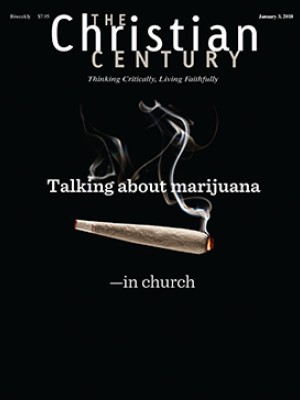American Decalogue
Jenna Weissman Joselit reveals how the Ten Commandments have shaped U.S. law and identity.
Recent debates about the removal of Confederate statues or about the Nashville Statement issued by evangelical Christian leaders involve the links between historical self-understanding, moral imagination, and modern ethical dilemmas. Should biblical texts shape a country’s legal code? How does the physicality of our monuments guide our understanding of history? To what extent does the way we tell our stories shape our moral judgments? Jenna Weissman Joselit illuminates how these same questions guide our country’s unique engagement with the Ten Commandments.
From the founding of our nation, Joselit argues, the Decalogue “furnished America with a pedigree.” In its comprehensiveness, the document held an intoxicating power:
If you were determined to establish a national identity, especially one burnished by a distinguished pedigree, there happened to be no better text on which to hang it than the Ten Commandments. In one fell swoop, it assembled the rule of law, the word of God, and the promise of singularity, joining them together in the vision of an ancient past and the prospect of a glorious future—and all under the banner of indigenousness. The Ten Commandments just happened to be the perfect foundational document.
Read our latest issue or browse back issues.
Empowered by its numerical structure and its pithy advertising-like copy, Americans used the Decalogue to establish a sense of self, a moral law, and feeling of belonging to something larger than the self.
Joselit identifies numerous points in American history when the Decalogue was cited as a justification of the American experiment. She writes about David Wyrick and his 1860 discovery of what he believed were the Israelite ancient tablets in the ground under Newark, Ohio. She also tells the story of Kansas populist politician Charles Walters, whose Decalogue Bill attempted to codify the commandments into legally enforceable elements. Included in his list? “If a resident of Kansas City was found guilty of treating his parents badly, he could be fined $500 and face the prospect of six months in jail. If a resident of Topeka committed adultery, his future did not look at all bright: he might have to spend the rest of his days in the state penitentiary.”
One of Joselit’s central interests is Hollywood’s obsession with the Ten Commandments (or at least its realization of their large market potential). She starts with the 1910 film The Life of Moses and then analyzes Cecil B. DeMille’s 1923 epic The Ten Commandments and his follow-up film 33 years later by the same name.
For Joselit, the convergence between cultural productions and the religious imagination runs deep. The second DeMille version of The Ten Commandments became “a holiday tradition,” she explains, as “households across the country tune in to ABC, or to one of its many affiliates, on the Sunday that falls midway between Passover and Easter for the lavishly staged, nearly four-hour-long broadcast.” She concludes, “whether you are Christian or Jewish, a regular worshipper or a reluctant one, you know these two springtime holidays are right around the corner when TV listings herald the film’s appearance.” In claims like these, Joselit seems to be pressing her narrative too forcefully on the data. While these films surely played a role in shaping the beliefs of many people, their impact was likely uneven across cultural and religious groups.
But the book convincingly portrays the motivations behind the Americanization of the Decalogue. Whether through films, legislation, or the yearning to find the ancient tablets on American soil, our country has been obsessed with making the Ten Commandments our own. We are a people who deeply desire a “message of deliverance, redemption, and the promise of perfectibility” as we seek out a justification for our position in the world. We hunger for words set in stone that might concretize our identity and sense of self.
In a nuanced way, Joselit works through the tenuous dance of American Jews and Christians around the Mount Sinai tablets. American Jews and their ACLU allies have been right to worry about a country that too closely married religious documentation to government decisions. The raising of the Decalogue is often quickly followed by a gesture toward the Sermon on the Mount. At the same time, the Ten Commandments are one part of the Hebrew scriptures that Christians are not so quick to discredit with references to the New Testament. Joselit shows us how the Decalogue has provided a link between Jews and Christians, moving the country’s self-understanding from that of a Christian nation to one with a deep “Judeo-Christian” heritage.
Joselit also compellingly critiques the American moral code, claiming that while “Americans may lay claim to a Ten Commandments charm bracelet, own their own copy of the film, and make a point of screening it annually . . . when it comes to their moral compass, they still need directions.” But it’s never been clear where this foundation should come from. In late 1800s, Felix Adler, founder of the Ethical Culture movement, wrote, “‘When there are so many pressing problems that challenge our attention,’ should we even be discussing this ancient code?” The Harvard economist Thomas Carver put it more directly in 1909, suggesting that America ought to focus less on the Ten Commandments and more on social problems of the day, such as “thou shalt not drink.” It’s more than a bit ironic that while this country spent significant time debating whether the tablets found in the Ohio soil were legitimate justification for the American experiment, and later watching Charlton Heston dance across the silver screen, the drumbeat of slavery, ownership, and dehumanization droned on.
If we admit that our biblical texts are not comprehensive in moral scope and may be more communal than individual in focus, then what role should they play in our morality? By placing this question in the context of a country wrestling with its historical self-understanding and vision for the future, Joselit starts a conversation that will be beneficial as we seek to recalibrate our own collective moral compass.






